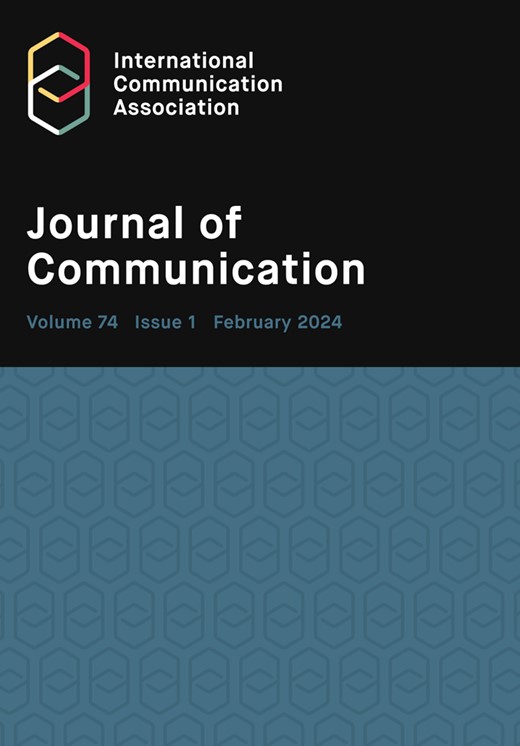Health Communication Campaigns and Their Impact on Public Health Behaviors
IF 6.1
1区 文学
Q1 COMMUNICATION
引用次数: 0
Abstract
Purpose: The general objective of this study was to explore health communication campaigns and their impact on public health behaviours. Methodology: The study adopted a desktop research methodology. Desk research refers to secondary data or that which can be collected without fieldwork. Desk research is basically involved in collecting data from existing resources hence it is often considered a low cost technique as compared to field research, as the main cost is involved in executive’s time, telephone charges and directories. Thus, the study relied on already published studies, reports and statistics. This secondary data was easily accessed through the online journals and library. Findings: The findings reveal that there exists a contextual and methodological gap relating to health communication campaigns and their impact on public health behaviours. Health communication campaigns played a crucial role in shaping public health behaviors and improving health outcomes by strategically disseminating information to educate and influence individuals towards healthier lifestyles. The effectiveness of these campaigns depended on message design, delivery channels, and the targeted health behaviors. Successful campaigns used a multi-channel approach, combining mass media, digital platforms, and community-based initiatives to reach diverse audiences. Despite challenges like socioeconomic barriers and misinformation, adaptive strategies and continuous evaluation helped overcome these obstacles. These findings highlighted the significance of health communication campaigns in improving public health and guiding policymakers in designing effective interventions. Unique Contribution to Theory, Practice and Policy: The Health Benefit Model (HBM), Social Cognitive Theory (SCT) and the Theory of Planned Behaviour may be used to anchor future studies on health communication campaigns and their impact on public health behaviours. Health communication campaigns were found to be more effective when grounded in behavioral science theories like the Health Belief Model, Social Cognitive Theory, and the Theory of Planned Behavior. Targeted messaging tailored to specific demographic groups and strategic use of multiple communication channels, such as mass media, digital media, and community outreach, significantly enhanced campaign impact. Sustained funding and policy support, integration with broader public health initiatives, robust evaluation mechanisms, and the development of culturally sensitive campaigns were recommended to maximize reach and effectiveness. These approaches ensured that health messages resonated with diverse populations and fostered sustained behavior change.健康传播活动及其对公众健康行为的影响
目的:本研究的总体目标是探讨健康传播活动及其对公众健康行为的影响。研究方法:本研究采用案头研究方法。案头研究指的是二手数据或无需实地考察即可收集到的数据。案头研究基本上是从现有资源中收集数据,因此与实地研究相比,案头研究通常被认为是一种低成本技术,因为主要成本涉及执行人员的时间、电话费和目录。因此,本研究依赖于已出版的研究、报告和统计数据。这些二手数据可通过在线期刊和图书馆轻松获取。研究结果:研究结果表明,在健康传播活动及其对公众健康行为的影响方面存在着背景和方法上的差距。健康传播运动在塑造公众健康行为和改善健康结果方面发挥着至关重要的作用,它通过有策略地传播信息来教育和影响个人养成更健康的生活方式。这些活动的效果取决于信息设计、传播渠道和目标健康行为。成功的宣传活动采用多渠道方法,将大众媒体、数字平台和社区活动相结合,以覆盖不同的受众。尽管存在社会经济障碍和错误信息等挑战,但适应性策略和持续评估有助于克服这些障碍。这些研究结果凸显了健康传播活动在改善公众健康和指导政策制定者设计有效干预措施方面的重要意义。对理论、实践和政策的独特贡献:健康效益模型(HBM)、社会认知理论(SCT)和计划行为理论可用于今后有关健康传播活动及其对公众健康行为影响的研究。研究发现,以健康信念模型、社会认知理论和计划行为理论等行为科学理论为基础的健康传播活动更为有效。为特定人口群体量身定制的针对性信息,以及对大众媒体、数字媒体和社区外联等多种传播渠道的战略性使用,大大增强了活动的影响力。建议持续提供资金和政策支持,与更广泛的公共卫生倡议相结合,建立健全的评估机制,并开展文化敏感性运动,以最大限度地扩大覆盖面和提高有效性。这些方法确保了健康信息能够引起不同人群的共鸣,并促进持续的行为改变。
本文章由计算机程序翻译,如有差异,请以英文原文为准。
求助全文
约1分钟内获得全文
求助全文
来源期刊

Journal of Communication
COMMUNICATION-
CiteScore
11.60
自引率
5.10%
发文量
41
期刊介绍:
The Journal of Communication, the flagship journal of the International Communication Association, is a vital publication for communication specialists and policymakers alike. Focusing on communication research, practice, policy, and theory, it delivers the latest and most significant findings in communication studies. The journal also includes an extensive book review section and symposia of selected studies on current issues. JoC publishes top-quality scholarship on all aspects of communication, with a particular interest in research that transcends disciplinary and sub-field boundaries.
 求助内容:
求助内容: 应助结果提醒方式:
应助结果提醒方式:


